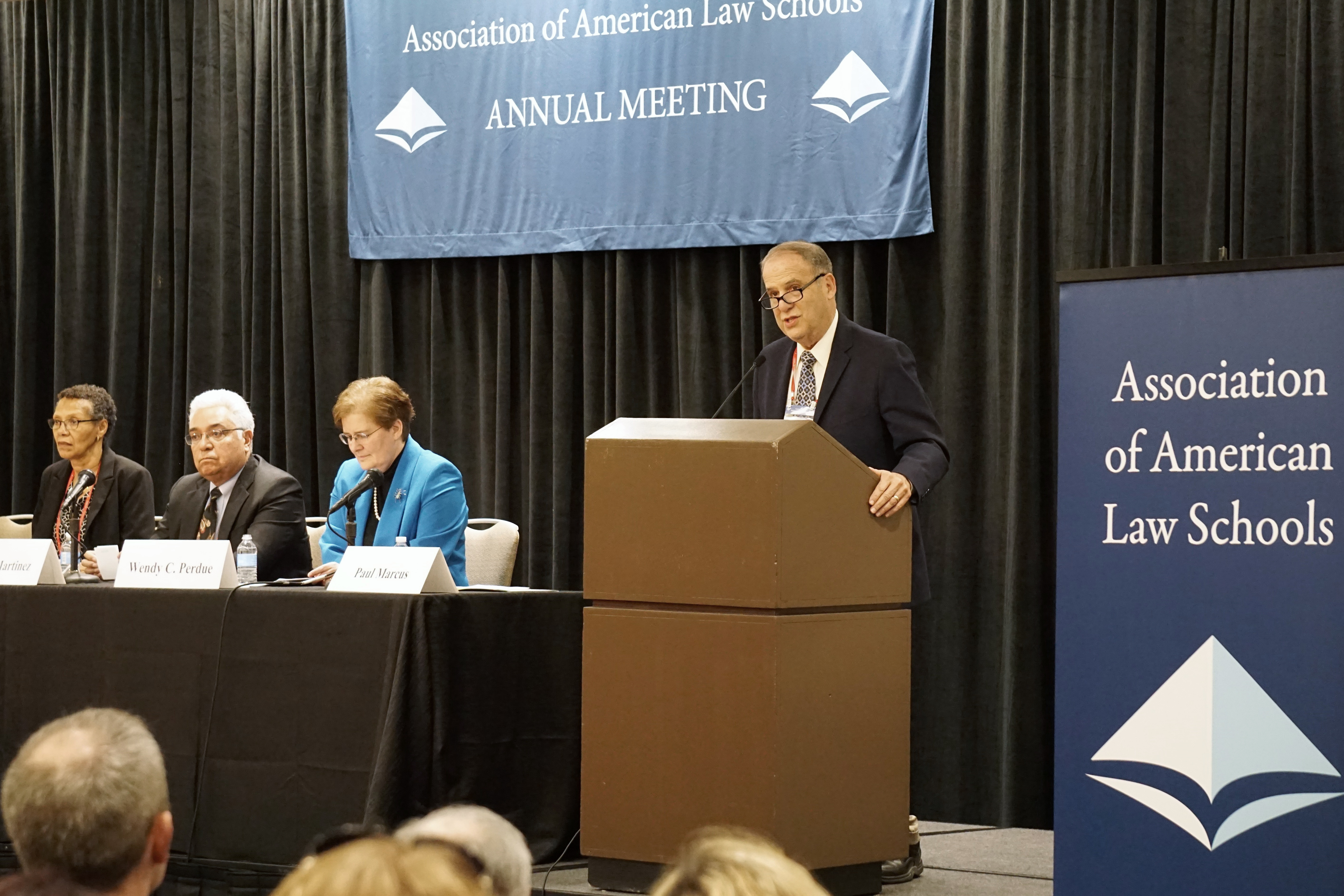A year ago, I stood before you and expressed my appreciation for the opportunity to serve as AALS president. I also mused about whether we would see any major changes develop in the next 12 months. Well, I am happy to say that not much has happened that is noteworthy since last January—it’s really been quite uneventful everywhere. Just more of the same old, same old.
Well, maybe not.
In the past year, we have seen a new administration in Washington. Parts of our nation and some of our member schools have struggled with awful weather disasters. As Americans, we have now repeatedly had communities suffer through terrible man-made calamities.
As people working in higher education, we have faced proposals coming out of our federal government that directly and negatively confront our schools, our faculties, and our students. In a host of areas such as health care, immigration, tax reform, and treatment of our fellow transgender citizens, we have seen proposed legislation and regulatory changes which would lead to dire consequences for many in our community. And, I am proud to say, AALS has responded forcefully and, I believe, with some real impact here.
There have been many changes since we last met. One area that has not changed, which many of you heard about earlier today in our plenary session, is access to justice. There, my distinguished colleagues offered some roadmaps for dealing with serious problems, but made clear that those serious problems remain in both civil representation and the right to counsel in criminal cases. I said back in San Francisco that assisting those in need was a high calling for all of us privileged to serve on law faculties. As Justice Sotomayor put it, “We educated, privileged lawyers have a professional and moral duty to represent the underrepresented in our society, to ensure that justice exists for all, both legal and economic justice.” That is certainly the case, and you have proved her right.
Since becoming an officer of the association, I have traveled to many schools throughout the nation. From North Carolina Central in the east to the University of Dayton in the Midwest, to UCLA in the west, and a number of points in between. I have read, as have you, that thousands of American law students provide services to the poor each year measuring in the many millions of dollars of time. Our faculty colleagues have stepped up in the face of terrible injustice regarding the right to travel in and out of our nation, as we witnessed in such stirring fashion last year in airports throughout the United States. We have clinics which greatly benefit our students and mightily serve those who do not ordinarily receive sound legal assistance. From veterans to the unfairly accused, to crime victims, to the elderly, to young students with special needs, our clinics provide great support to those in need.
 2017 AALS President Paul Marcus, William & Mary Law School, addresses the House of Representatives during the First Meeting along with Ginger Patterson, AALS Associate Director; Leo Martinez, University of California, Hastings College of the Law; and 2018 AALS President Wendy Perdue, Dean, University of Richmond School of Law
2017 AALS President Paul Marcus, William & Mary Law School, addresses the House of Representatives during the First Meeting along with Ginger Patterson, AALS Associate Director; Leo Martinez, University of California, Hastings College of the Law; and 2018 AALS President Wendy Perdue, Dean, University of Richmond School of Law
Not too long ago I was in Chicago and met with seven law deans from that region. I was struck by the innovative and significant programs these schools have developed, programs which directly move toward achieving access to justice for many:
These are but a few of the many ways in which law schools, faculty colleagues, and our students make a genuine difference in the way poor people in our nation are served by the law. Justice Scalia was right: “Without access to quality representation there is no justice.”
As I come to the end of my term as AALS president, I must express my appreciation to many. To the hundreds and hundreds of law faculty who make AALS succeed through your diligent work as volunteers in a host of areas. To the terrific AALS staff who work seemingly endless hours to make this conference a success and to support all that we do. To my predecessor Kellye Testy, who now heads up LSAC. To my successor Wendy Perdue, who will be a great president. To the dedicated and creative colleagues with whom I have served on the Executive Committee: you made it all positive, and all fun. So much good that happens with AALS truly is because of you. I thank you so very much.